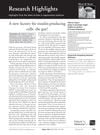 January 2019 in “Springer eBooks”
January 2019 in “Springer eBooks” Modified HDL can better deliver drugs and genes, potentially improving treatments and reducing side effects.
December 2023 in “Acta dermato-venereologica” Metformin might help treat certain skin conditions, but more research is needed.
 36 citations,
July 2014 in “Neuromuscular Disorders”
36 citations,
July 2014 in “Neuromuscular Disorders” A patient with a larger than usual genetic mutation had a broader range of symptoms for a muscle disease.
 14 citations,
May 2020 in “Archiv für Tierzucht”
14 citations,
May 2020 in “Archiv für Tierzucht” Researchers identified genes that may affect hair growth in Cashmere goats.
1 citations,
July 2022 in “British Journal of Dermatology” Targeting specific genes in certain pathways may help treat male pattern baldness.
 June 2023 in “Frontiers in Medicine”
June 2023 in “Frontiers in Medicine” Protein tyrosine kinases are key in male pattern baldness, affecting skin structure, hair growth, and immune responses.
 1 citations,
October 2022 in “International journal of endocrinology”
1 citations,
October 2022 in “International journal of endocrinology” Dihydrotestosterone changes some hormone-related gene expressions in rat pituitary glands but doesn't affect the estrous cycle.
 June 2022 in “Authorea (Authorea)”
June 2022 in “Authorea (Authorea)” Efficient delivery systems are needed for the clinical use of CRISPR-Cas9 gene editing.
 103 citations,
March 2015 in “Nature Communications”
103 citations,
March 2015 in “Nature Communications” A genetic region near the PAX1 gene is linked to a higher risk of scoliosis in females.
April 2023 in “Medizinische Genetik” Male-pattern hair loss is largely influenced by genetics, with key genes identified.
 May 2024 in “Archives of dermatological research”
May 2024 in “Archives of dermatological research” Enz_MoriL from mulberry leaves helps hair growth by affecting specific cell pathways.
 September 2024 in “Journal of Cutaneous and Aesthetic Surgery”
September 2024 in “Journal of Cutaneous and Aesthetic Surgery” Bicalutamide may help treat female pattern hair loss.
 3 citations,
July 2022 in “Stem Cell Research & Therapy”
3 citations,
July 2022 in “Stem Cell Research & Therapy” Turning off a specific gene in stem cells speeds up skin healing by helping cells move better.
September 2024 in “Fitoterapia” Camellia oleifera seed shell polyphenols and 1,3,6-tri-O-galloylglucose can help treat hair loss by reducing certain hormones and promoting hair growth.
 April 2016 in “Journal of Investigative Dermatology”
April 2016 in “Journal of Investigative Dermatology” SOX4 is crucial for the development of melanoma.
November 2024 in “European Journal of Pharmacology” MitoQ may help treat hair loss by boosting hair growth pathways.
 10 citations,
August 2020 in “Journal of Bioscience and Bioengineering”
10 citations,
August 2020 in “Journal of Bioscience and Bioengineering” Platelet-rich plasma can potentially improve hair regeneration by increasing follicular gene expression and hair growth activity.
 49 citations,
July 2009 in “Fitoterapia”
49 citations,
July 2009 in “Fitoterapia” Essential oils from Chamaecyparis obtusa may help hair grow by increasing a growth-related gene.
 2 citations,
January 2019 in “Annals of Dermatology”
2 citations,
January 2019 in “Annals of Dermatology” Melandrium firmum extract helps mice grow hair by blocking a hair loss enzyme and changing hair growth genes.
3 citations,
April 2022 in “Biomolecules” Higher miR-34a levels and the A variant of the MIR-34A gene are linked to increased risk and severity of alopecia areata.
February 2025 in “International Journal of Molecular Sciences” Maternal melatonin improves offspring hair growth by affecting specific proteins and pathways.
 4 citations,
February 2022 in “Frontiers in molecular biosciences”
4 citations,
February 2022 in “Frontiers in molecular biosciences” Chronic stress in mice changes skin metabolism and gene expression, leading to hair loss.
 26 citations,
February 1998 in “Chemico-Biological Interactions”
26 citations,
February 1998 in “Chemico-Biological Interactions” Scientists identified three genes important for processing certain brain chemicals, thyroid hormones, and medications.
 42 citations,
January 2019 in “Frontiers in Immunology”
42 citations,
January 2019 in “Frontiers in Immunology” A blood pressure drug, diltiazem, may also help treat influenza.
 36 citations,
January 2017 in “Journal of Obstetrics and Gynaecology Research”
36 citations,
January 2017 in “Journal of Obstetrics and Gynaecology Research” The review found no clear link between vitamin D receptor gene variations and polycystic ovary syndrome.
 August 2014 in “Journal of clinical & experimental dermatology research”
August 2014 in “Journal of clinical & experimental dermatology research” Herbal stimulants in Cerita hair tonic can significantly reduce hair loss and the side effects of Minoxidil 1%.
 April 2018 in “Journal of Investigative Dermatology”
April 2018 in “Journal of Investigative Dermatology” The document concludes that ERBB2 mutations are common in extramammary Paget disease and may respond to systemic treatments like cancer immunotherapy.
 7 citations,
July 2012 in “Regenerative Medicine”
7 citations,
July 2012 in “Regenerative Medicine” New treatments for diabetes, central nervous system repair, and cartilage injury were found, and a way to create functional hair follicles from stem cells was developed.
 April 2023 in “Biomedical Journal of Scientific and Technical Research”
April 2023 in “Biomedical Journal of Scientific and Technical Research” Indian head cactus extract may help hair grow by boosting important cell activity and gene expression.
 13 citations,
August 2020 in “Frontiers in Cell and Developmental Biology”
13 citations,
August 2020 in “Frontiers in Cell and Developmental Biology” Twist1 helps maintain important features of cells crucial for hair growth by working with Tcf4 and β-catenin.























